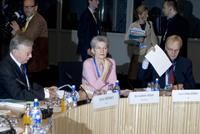Brussels, 20/10/2006
The European Council of March 2006 invited the European Commission to examine in greater depth the concept of flexicurity. At the tripartite social summit, the ETUC reaffirmed its willingness to take part in a discussion on flexicurity. But the crucial question relates to what exactly this concept covers and how it is applied in practice.
“We are in favour of flexicurity, on the condition that it creates a win-win situation for workers as well as for companies - in other words a flexicurity that lays emphasis on the quality of employment and industrial relations. The European Union needs a flexicurity that develops potential for workers and for jobs. This presupposes policies to promote lifelong learning, and active policies on employment, social protection and support for workers during all forms of transition,” declared ETUC General Secretary John Monks.
The ETUC is aware that there is no single, strict definition of flexicurity, and it emphasised its own interpretation at this informal summit. The European trade union movement will not accept, under any circumstances, that flexibility should take precedence over security.
The ETUC called for a balanced approach combining strong social support with active measures to assist workers during periods of transition, as is the case in Scandinavian countries. A flexicurity that merely forces employees to abandon their fundamental rights and accept increasingly precarious jobs is unacceptable to the ETUC. It would amount to no more than a source of insecurity, and would be counter-productive.
ETUC General Secretary, John Monks
UNI-EUROPA Regional Secretary, Bernadette Segol
President of SAK (Finland), Lauri Ihalainen

